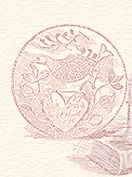Ihr liewe Leit:
In seim Gedicht "Der alt Dengelschtock" hot der Lee Light Grumbine
(1858-1904) mol gschriwwe:
Der alt Dengelschtock,
Datt schteckt er im Block,
Unnerm alde Pundabbelbaam.
Am Nascht henkt die Sens--
Der Reche bei der Fens--
Seh alles wie en scheener Draam.
Die Sunn geht uff,
Kumm, Buwe, schteht uff,
Schunn lang sin die Haahne am Greehe.
Dihr faule Bengele,
Macht eich and Dengele,
Nooch em Friehschtick geht's ans Meehe.
Dengelschtock? En gleener Ambos, kennt mer saage, owwe breed fer
die Sensgling (-schneid) drufflege, un schpitzich unne. Mer hot em
Dengelschtock sie Schpitz graad in em Bamschtumbe odder Block odder
Fensposchde gedriwwe, hot dann die Sensschneid (-gling) uff der Dengelschtock
owwedruff gelegt, un hot dann mit dem Dengelhammer uff die Gling gedengelt-odder
gehammert, kennt mer saage. Die Schneid iss dann gans dinn, un deswege gans
scharref, warre.
Un der Hammer, wie en Glock,
Uff em Dengelschtock
Schpielt sei Leid-ich heer's noch heit.
Glingel, glengel,
Wetz un dengel,
Der Dengelschtock glangt un glingt;
Glingel, glengel, Hammer un dengel,
Heer was der Dengelschtock singt.
Awwer wann die Meeher en Weil gemeeht hen, waar's notwennich fer
die Sense zu wetze.
Wann die Sens watt schtumm,
Iss der Oxehannkumm
Middem Weetzschtee aa net weit.
Oxehannkumm (-kump)? Mer kennt aa Wetzkumm (-kump) saage. Es waar
en ausgehiehldes Oxe- odder Kiehhann fer nausnemme ins Feld. Die Meeher hen
Wasser odder Essich drin ghatt,un domit hen sie ihre Schleifschtee immer nass
halde kenne.
Un des Wetze singt aa en abbaddiches Lied. Mer gehne noch ee Mol
zerrick zum Keller seim Gedicht:
Wetz emol un schnauft debei,
Wetze, des muss efders sei:
Tu witt, tu watt,
Tu witt, tu watt, tu weet;
Ihr macht's fasstreet--
Tu witt, tu watt,
Gut gewetzt is halb gemeeht!
Macht's gut,
Der Alt Professer
|
Dear people:
In his poem "The Old Scythe Anvil" Lee Light Grumbine (1858-1904)
once wrote:
The old scythe anvil,
There is sticks in a log,
Under the old Poundapple tree.
On a branch hangs the scythe-
The rake is by the fence-
I see everything as in a nice dream.
The sun rises,
Come, boys, get up (out of bed),
The cocks have been crowing a long time.
You lazy fellows,
Start in to hammer (the scythes),
After breakfast we start in to mow.
"Dengelstock"? A small anvil, you could say, on top broad for the
scythe blade to be laid on, and pointed below. You simply drove the point
of the anvil into a tree stump or log or fence post, laid the blade of the
scythe onto the top of the anvil and then "dengelt" - or hammered, one
could say, with the sharpening hammer on the blade of the scythe. The
blade then became very thin, and therefore very sharp.
And the hammer, like a bell,
On the anvil
Plays its song-I hear it yet today.
Cling, clang,
Sharpen and hammer,
The sharpening anvil clings and clangs:
Cling, clang,
Hammer and sharpen,
Hear what the anvil is singing.
But when the mowers had mowed for a while, it was necessary to whet the
scythe.
When the scythe gets dull,
The ox horn
Along with the whetting stone is not far.
Ox horn? You could also say whetting horn. It was a hollowed-out ox
or cow horn to take out into the field. The mowers had water or vinegar in
the hollow horn, and with this liquid they could always keep their
whetting stone wet.
And this whetting also sings a particular song. We once more go
back to the poem of Eli Keller:
Whet once and breath along,
Whetting, it has to be done oftener:
Tuwhitt, tuwhatt,
Tuwhitt, tuwhatt, tuwheet;
You're doing it first rate--
Tuwhitt, tuwhatt,
Well-honed is half the job of mowing!
Take care,
The Old Professor |













